|
CONTRIBUTIONS TO UNION VICTORY
Charleston, the hotbed of secession, fell into Union hands in early
1865. Fittingly, the 21st U.S. Colored Infantry were the first Federals
to enter the city, followed closely by two companies from the 54th
Massachusetts. Richmond, the Confederate capital, held out until April.
Again, the honor of being the first Union troops to occupy the city went
to black soldiers.
At first, they were an unexploited resource, but once the Lincoln
administration lifted the ban, African Americans pulled on the uniform
and contributed mightily to the ultimate victory. Almost 179,000 black
men served in the Union army. They fought in 41 major battles and 449
minor engagements. Sixteen received Medals of Honor for valor on the
battlefield; many more deserved them but their conduct went
unrecognized. By the war's end, almost 37,000 black soldiers gave their
lives to the restoration of the union and the destruction of
slavery.
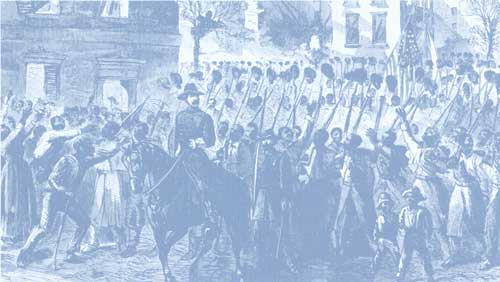
|
THE 55TH MASSACHUSETTS COLORED REGIMENT MARCHES INTO CHARLESTON.
(HARPER'S WEEKLY)
|
Shortly after the Confederate surrender, Major Martin Delany, one of
the highest-ranking black officers in the war, announced to a black
audience, "Do you know that if it was not for the black men this war
never would have been brought to a close with success to the Union, and
the liberty of your race if it had not been for the Negro?"
These words sound bold, perhaps even overblown. But his statement
differed little from Abraham Lincoln's own assessment. As early as
mid-1863, Lincoln foresaw emancipation and black enlistment as the
policy that would eventually win the war. "I believe it is a resource
which if vigorously applied right now, will soon close out the contest,"
he predicted to Grant. One year later, Lincoln argued that any true
supporter of the Union war effort must also endorse black military
service. "And now let any Union man who complains of the measure," he
challenged, "test himself by writing down in one line that he is for
subduing the rebellion by force of arms; and in the next, that he is for
taking these hundred and thirty thousand men from the Union side, and
placing them where they would be but for the measure he condemns. If he
cannot face his case so stated, it is only because he cannot face the
truth."
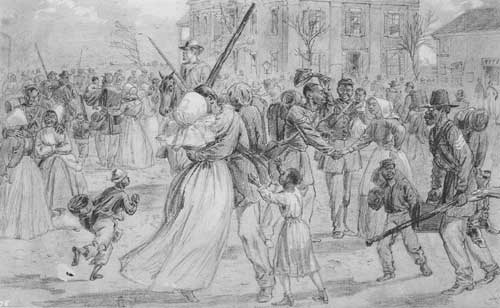
|
A SKETCH OF BLACK SOLDIERS MUSTERING OUT OF SERVICE IN ARKANSAS. (LC)
|
The following month, in even blunter terms, Lincoln admitted that the
Union could not win without the aid of African Americans. "Any different
policy in regard to the colored men," he explained, "deprives us of his
help, and this is more than we can bear. We can not spare the hundred
and forty or fifty thousand now serving us as soldiers, seamen, and
laborers. This is not a question of sentiment or taste, but one of
physical force which may be measured and estimated as horsepower and
Steam-power are measured and estimated. Keep it and you can save the
Union. Throw it away, and the Union goes with it."
By the end of the war, black soldiers had won the grudging respect of
virtually all white Union troops. The bulk of white men in Union blue
knew that the USCT had contributed in real and significant ways to Union
victory. Most of them retained their prejudices, but few would dispute
the assertion that blacks made good soldiers. And while many were
reluctant to grant African Americans the right to vote at that time,
quite a number did believe that the government should single out black
soldiers and bestow on them the franchise as a reward for honorable
wartime service. In 1870, adoption of the Fifteenth Amendment to the
U.S. Constitution resolved the debate by granting black people the right
to vote.
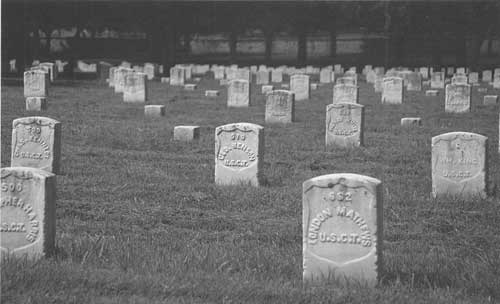
|
MEMBERS OF THE UNITED STATES COLORED TROOPS BURIED AT STONES RIVER
NATIONAL CEMETERY. (PHOTO BY LOU SMITH)
|
Many of the black units remained on active service long after
Appomattox, performing occupation duty in the Southern states and
serving in the West. But by 1867, the government had mustered them all
out of service. The USCT was no more. Six black Regular Army regiments,
later cut to four—24th and 25th Infantry Regiments and 9th and 10th
Cavalry Regiments—when Congress reduced the size of the army, stood
as its legacy.
Once they reached home, black soldiers were local heroes for the
important part they played in winning freedom for their race. Many of
them assumed leadership roles in the black community. Numerous black
politicians served in the USCT, while other black veterans occupied
positions of central importance outside the political arena. Elijah
Marrs, for example, rose to become a prominent clergyman in the postwar
world.
Returning soldiers had other advantages as well. Perhaps a half or
more learned to read and write in military service, which placed them in
a better position to succeed in freedom. With the pay and enlistment
bounties, black veterans were able to buy land, invest in businesses, or
finance more schooling, some of them even earning college degrees.
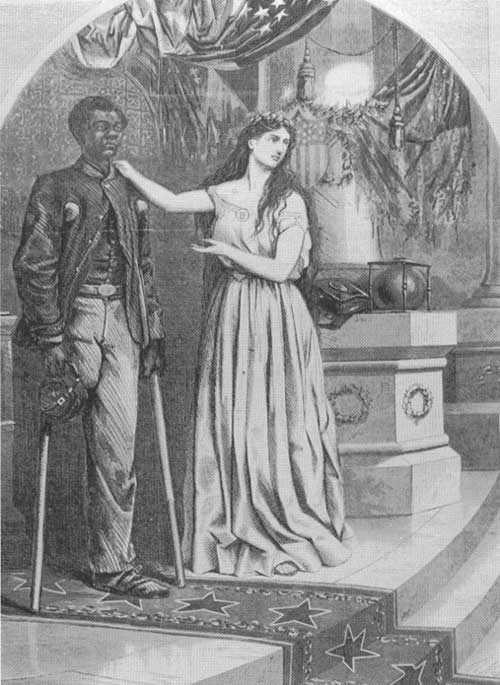
|
AFTER SERVING BRAVELY IN THE CIVIL WAR, AFRICAN AMERICANS WON THEIR
FREEDOM BUT NOT EQUALITY IN THE EYES OF MANY. (FW)
|
While many black soldiers benefited from their time in the Union
army, others struggled in their postwar years. If they returned to the
secessionist states, local whites made them feel unwelcome. They and
their families endured harassment, physical abuse, and economic
discrimination.
Some men had marched off to war in prime condition and returned as
physical wrecks. Veterans suffered debilitating wounds or illnesses and
were incapable of performing manual labor. They eked out meager
existences for the remainder of their lives, often dependent on a small
army pension as the source of their subsistence.
Saddest of all, though, with the passing of each decade, the white
population forgot more and more about black military service in the war.
And by the time of the First World War, black Americans had to fight all
the same stereotypes that their Civil War ancestors had battled half a
century before.
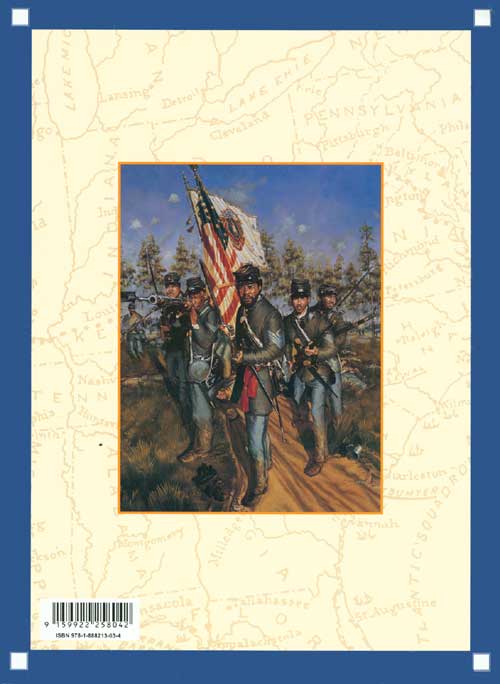
|
BACK COVER: 54TH MASSACHUSETTS VOLUNTEER INFRANTRY, BATTLE
OF OLUSTEE, FLORIDA, BY TODD HASKIN FREDERICKS, BURNSVILLE,
MN.
|
|
|
